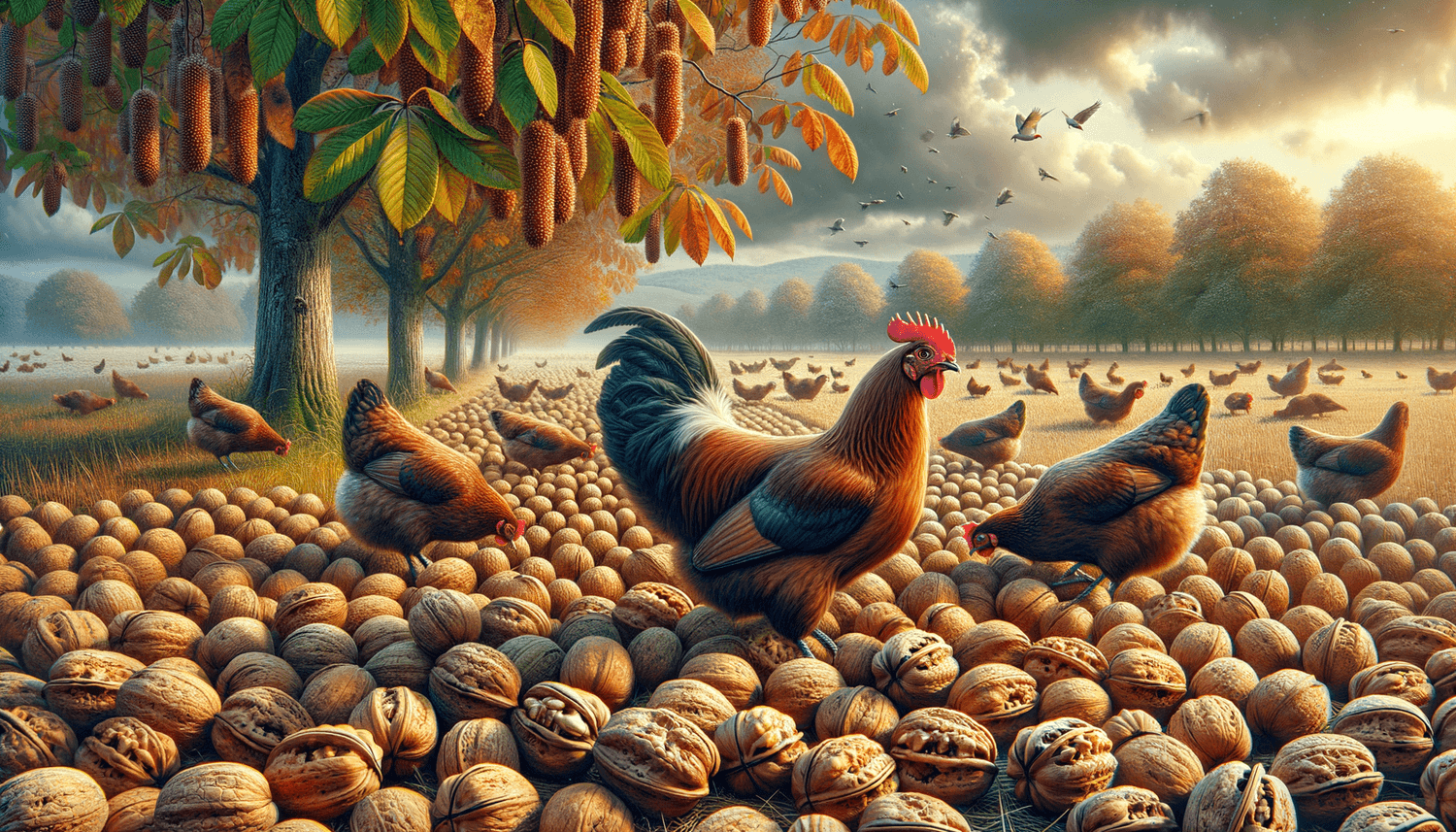Hey there, backyard chicken enthusiasts! Have you ever wondered if your clucky companions can enjoy the dark, rich wonders of black walnut hulls? The answer to this nutty conundrum isn’t as simple as a peck and a cluck! Join us as we dive into the world of chickens and black walnut hulls, discussing their nutritional value, potential benefits and risks, and whether these mysterious hulls can join the ranks of your chickens’ well-balanced diet. Plus, we’ll even share some tips for preparing this unusual treat for your feathered friends. So, let’s crack open this nutty mystery and find out if black walnut hulls are the missing piece to your flock’s culinary delights!
Can chickens eat black walnut hulls?
Chickens should NOT eat black walnut hulls, as they are not safe for consumption. Black walnut hulls contain a compound called juglone, which can prove to be toxic to chickens, causing health issues or even death. Instead, it is best to offer chickens a variety of other safe, healthy, and nutritious treats to ensure their well-being.
A balanced diet for happy, healthy chickens
Just like us humans, chickens need a balanced diet to thrive and stay healthy. Providing the right combination of nutrients not only keeps chickens strong and energetic but also significantly contributes to their overall well-being. The cornerstone of a chicken’s diet is, of course, high-quality chicken feed. This specially formulated feed ensures that your feathered friends receive the perfect balance of protein, vitamins, and minerals to sustain their growth and egg production.
Chicken feed should make up a whopping 80-90% of a chicken’s diet, and for good reason! These carefully crafted feeds are designed specifically to cater to the intricate nutritional needs of your backyard flock. Once you’ve got this foundation in place, the remaining 10-20% of your chickens’ diet can be made up of exciting and delicious treats like fruits, vegetables, and even some grains. Just remember that moderation and variety are key when introducing these tasty morsels to ensure a balanced and happy flock.
Nutritional value of black walnut hulls for chickens.
As previously mentioned, chickens should not eat black walnut hulls due to the presence of the toxin juglone. Although black walnuts can offer some nutritional benefits for humans, their hulls are hazardous to chickens and should be kept off the menu. The potential harm caused by juglone far outweighs any possible nutritional value that they may contain for our clucky friends.
Juglone is a natural compound found in black walnut hulls which can be toxic to various plants and animals, including chickens, through ingestion or contact. This toxic compound can result in significant health concerns or even mortality among chickens. Therefore, it is essential to provide alternative, safe, and nutritious treats for your flock rather than exposing them to the risks associated with black walnut hull consumption.
Nutrition table of black walnut hulls for chickens.
| Information | Description |
|---|---|
| Nutritional Value | Not applicable, as chickens should not eat black walnut hulls due to the toxic compound juglone. |
| Suggested Serving Size | None. Black walnut hulls are not recommended for chickens as they pose significant health risks. |
| Safe Feeding Practices | Avoid feeding black walnut hulls to chickens altogether to prevent exposure to the toxic juglone. |
| Preparation | Not applicable, as black walnut hulls are not suitable for chicken consumption. |
| Potential Risks | Exposure to juglone compound in black walnut hulls can lead to serious health issues or even death for chickens. |
| Hydration | Not applicable, as black walnut hulls should not be part of a chicken’s diet. |
| Digestion | Not applicable, as chickens should not consume black walnut hulls. |
| Seasonal Availability | Though black walnut harvests typically occur in the fall, black walnut hulls are not appropriate for chickens. |
| Other Benefits | None for chickens, as black walnut hulls pose significant health risks and should be avoided. |
Alternatives to black walnut hulls
Since black walnut hulls are not suitable for chicken consumption, it’s important to consider alternative treats that may offer nutritional benefits and enjoyment for your flock without the risk of toxic exposure. A wide variety of fruits, vegetables, and grains are appropriate treats that can complement your chickens’ diet and support their overall health.
Safe fruit and vegetable treats
When looking for nutritious and safe treats for chickens, you can offer a variety of fruits and vegetables, such as apples, berries, cabbage, carrots, kale, melon, pumpkin, and spinach. Be sure to only provide these treats in moderation and alongside a quality chicken feed to ensure a balanced diet. Additionally, always remove any pits or seeds that might be harmful, and chop or shred larger produce items for easier consumption.
Fun foraging treats
Chickens enjoy foraging and will benefit from a stimulating environment that encourages their natural instincts. Simply scattering scratch grains, mealworms, or sunflower seeds around your chicken coop is an excellent way to not only offer a nutritious treat but also provide entertainment and exercise for your birds. Introducing a variety of herbs, like parsley, oregano, and mint, can add an extra layer of flavor and benefits to their diet.
Maintaining a healthy flock
Last but not least, remember that proper care goes beyond providing a balanced diet. Access to clean water, safe housing, and a clean environment is just as essential to the health and well-being of your chicken flock. Consider implementing a regular routine for cleaning, monitoring, and maintaining your coop, and be sure to consult a veterinarian if you have concerns about the health of your birds.
By prioritizing the safety and health of your chickens, you can enjoy the companionship and rewards they bring for years to come. Happy and healthy chickens make for happy backyard chicken keepers!

















